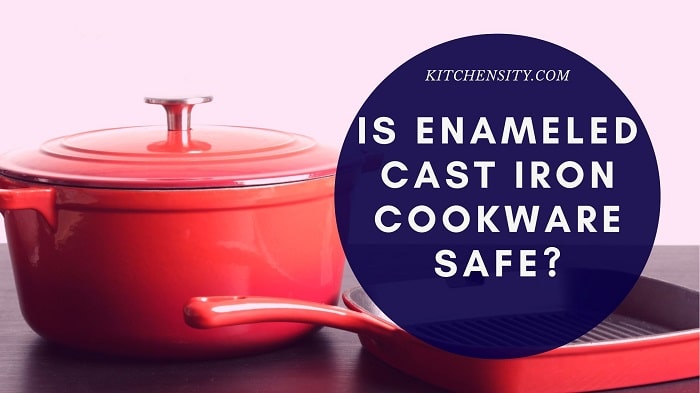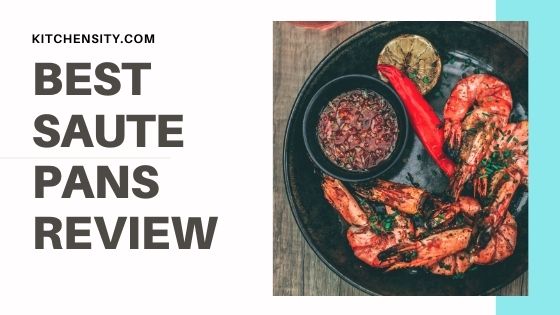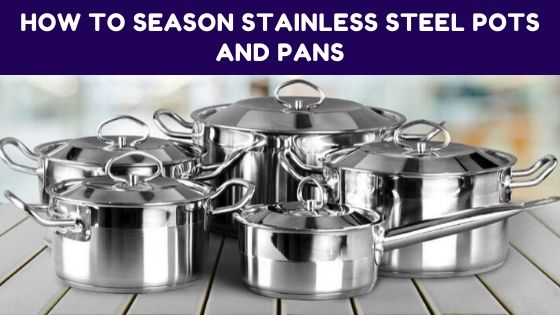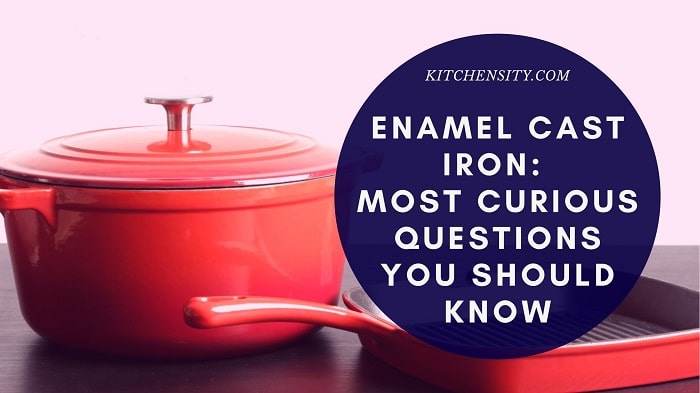Enameled cast iron cookware has gained significant popularity among home cooks and professional chefs alike, thanks to its exceptional durability, versatility, and safety features.
Enamel, a smooth and protective coating applied to raw cast iron cookware, plays a crucial role in preventing rusting and ensuring the cookware remains smooth and durable.
In this article, we will discuss the safety of enameled cast iron cookware, addressing concerns and providing information to help you make an informed decision about using this cookware in your kitchen.

Table of Contents
- 1 Is Enameled Cast Iron Cookware Safe?
- 2 How Does The Enamel Coating Acts As A Barrier For Toxic Substances?
- 3 Is Enamel Cast Iron Cookware Toxic?
- 4 Enamel Cast Iron Health Risk
- 5 Which Is Better Cast Iron Or Enameled Cast Iron?
- 6 Does Lodge Enameled Cast Iron Contain Lead?
- 7 Final Verdict
- 8 You May Also Like
- 9 FAQs
Is Enameled Cast Iron Cookware Safe?
Yes, enameled cast iron cookware is safe to use. The enamel coating acts as a protective barrier, preventing the cookware from reacting with food and releasing harmful chemicals. It is considered a reliable and durable option for safe cooking.
Additionally, enameled cast iron cookware meets safety standards set by regulatory authorities such as the FDA, further ensuring its safety for cooking.
Also Read – Why Griswold Cast Iron Is So Expensive?
How Does The Enamel Coating Acts As A Barrier For Toxic Substances?
The enamel coating on cast iron cookware acts as a protective barrier, preventing the transfer of toxic substances from the cast iron to the food being cooked. It creates a non-reactive and nonporous surface that ensures the safety and purity of the cooked food.
Let’s delve deeper into these concerns:
- Barrier Against Iron Transfer:
- One common concern with raw cast iron cookware is the potential leaching of iron into food.
- However, with enameled cast iron, the enamel coating acts as a protective barrier that prevents the transfer of iron or any other substances into the food.
- The vitreous enamel layer seals the surface, creating an impermeable barrier that ensures the food only comes into contact with the non-reactive enamel, not the cast iron beneath.
- This feature makes enameled cast iron cookware a safe choice for food preparation.
- Non-Toxic Materials:
- It’s important to assure readers that the enamel used in the manufacturing of enameled cast iron cookware is made from non-toxic materials.
- The composition of the enamel includes minerals such as silica, feldspar, and borax, which are considered safe for food contact.
- These materials transform the high-temperature firing process, converting into a vitreous and stable glass-like substance that adheres securely to the cast iron.
- Reputable manufacturers follow strict quality standards to ensure their enamel coatings comply with safety regulations and certifications.
- Supporting Evidence:
- To further support the claim of non-toxicity, references to relevant studies or official statements can be provided.
- For example, the U.S. Food and Drug Administration (FDA) sets regulations and guidelines for food contact materials.
- Assure readers that enameled cast iron cookware adheres to these standards.
- Citing specific FDA regulations, such as those related to the leachability of lead and cadmium, can provide reassurance about the safety of the enamel coating.
Also Read – Can You Use Olive Oil To Season Cast Iron Pans?
Is Enamel Cast Iron Cookware Toxic?
No, enameled cast iron is not toxic. The enamel coating used in enameled cast iron cookware is made of non-toxic materials, typically including minerals like silica, feldspar, and borax.
These materials undergo a high-temperature firing process, transforming into a vitreous and stable glass-like substance that adheres securely to the cast iron.
This enamel coating provides a smooth and non-reactive surface, preventing the transfer of any harmful substances into food.
The non-toxic nature of enameled cast iron is further reinforced by the fact that reputable manufacturers adhere to strict safety standards and regulations.
For example, they comply with guidelines set by regulatory authorities like the United States Food and Drug Administration (FDA), which ensure that the cookware meets safety requirements for food contact.
It is important to note that while enameled cast iron itself is non-toxic, it is always recommended to follow proper cooking and care instructions provided by the manufacturer.
This includes avoiding extreme temperature changes, using utensils suitable for non-stick surfaces to prevent scratching the enamel, and not using damaged cookware that may compromise the integrity of the enamel coating.
Also Read – Do You Need To Season Enameled Cast Iron?
Enamel Cast Iron Health Risk
Enamel cast iron cookware poses minimal health risks when used correctly and purchased from reputable brands.
However, it is important to address a few considerations to ensure safe usage:
- Chipping Or Damaged Enamel:
- If the enamel coating on the cast iron cookware becomes chipped, cracked, or damaged, it is advisable to discontinue using it.
- Exposed cast iron underneath the damaged enamel can react with certain foods and potentially release iron into the food.
- Additionally, chipped enamel can harbor bacteria or other contaminants, compromising food safety.
- Regularly inspect your enamel cast iron cookware for any signs of damage and replace it if necessary.
- Acidic Foods:
- While enameled cast iron is generally safe for cooking acidic foods, prolonged or excessive exposure to highly acidic ingredients may cause minor interactions between the food and the enamel.
- This can result in slight discoloration or a metallic taste in the food.
- If you notice any changes in the appearance or taste, it is advisable to consult the manufacturer’s guidelines or avoid cooking highly acidic foods in enameled cast iron cookware.
- Allergies Or Sensitivities: Some individuals may have specific allergies or sensitivities to certain materials used in the enamel coating. If you have known allergies or sensitivities, it is recommended to review the composition of the enamel and consult with the manufacturer to ensure it is safe for your specific needs.
- Care And Maintenance: Proper care and maintenance of enameled cast iron cookware are crucial for ensuring its longevity and safety. Follow the manufacturer’s instructions regarding cleaning, seasoning (if required), and storage. Avoid using abrasive materials or harsh cleaning agents that can damage the enamel. Always handle the cookware with care to prevent accidental damage.
By being aware of these considerations and following the manufacturer’s guidelines, you can minimize any potential health risks associated with enameled cast iron cookware.
It is also recommended to purchase from reputable brands that prioritize safety and compliance with relevant regulations to further ensure the quality and safety of the cookware.
Also Read – Can You Use Enameled Cast Iron On A Glass Cooktop?
Which Is Better Cast Iron Or Enameled Cast Iron?
The choice between cast iron and enameled cast iron depends on personal preferences and needs. Cast iron offers excellent heat retention and durability but requires seasoning and maintenance, while enameled cast iron provides a non-reactive surface, easier cleaning, and vibrant color options without the need for seasoning.
Consider your cooking style and maintenance preferences to determine which option is better suited for you.
When deciding between cast iron and enameled cast iron, it’s important to consider the following steps to determine which option is better for you:
- Assess Heat Retention And Durability:
- Cast iron is known for its exceptional heat retention, which allows for even cooking and excellent searing.
- It is also highly durable and can withstand high temperatures and rough handling.
- Enameled cast iron, on the other hand, retains heat well but may not have the same level of heat retention as raw cast iron.
- However, it compensates with added durability due to the protective enamel coating.
- Consider Maintenance Requirements:
- Cast iron requires regular seasoning, which involves applying oil to create a non-stick surface and prevent rusting.
- Seasoning also adds flavor and enhances the natural non-stick properties of the cookware.
- Enameled cast iron, on the other hand, does not require seasoning.
- Its enamel coating provides a naturally non-stick surface and protects the cookware from rusting.
- This makes enameled cast iron easier to clean and maintain compared to raw cast iron.
- Evaluate Reactivity With Food:
- Raw cast iron has a natural tendency to react with certain acidic or alkaline foods, which can affect the taste and color of the food.
- Enameled cast iron, with its non-reactive enamel coating, eliminates this concern.
- It provides a barrier between the food and the iron, ensuring that there is no interaction or transfer of flavors or colors.
- Consider Aesthetic Preferences: Enameled cast iron offers a wide range of vibrant colors and finishes, adding a touch of style and personalization to your kitchen. Raw cast iron has a more rustic and traditional look, which may appeal to those who appreciate its classic charm.
Ultimately, the choice between cast iron and enameled cast iron depends on your cooking style, maintenance preferences, and aesthetic considerations.
If you value the traditional qualities of raw cast iron, don’t mind the seasoning process, and enjoy the enhanced heat retention, raw cast iron may be the better option for you.
On the other hand, if you prefer easy maintenance, a non-reactive surface, and a variety of colors to match your kitchen decor, enameled cast iron would be the preferred choice.
Also Read – Can You Put Enamel Cast Iron In The Dishwasher?
Does Lodge Enameled Cast Iron Contain Lead?
Lead contamination is a legitimate concern for individuals seeking safe cookware options. Reputable manufacturers of enameled cast iron cookware, such as Lodge, prioritize the safety of their products and take extensive measures to ensure they are free from lead or other harmful substances.
Lodge enameled cast iron utilizes the U.S. Food and Drug Administration Test Procedure 7.5.1.4a Leachability of Lead and Cadmium for Glazed Ceramic Surfaces.
Their cookware complies with the standards set by the United States Food & Drug Administration (FDA). So, no need to worry about lead or any chemical leaching.
Here are some safety measures taken:
- Strict Material Selection:
- To prevent lead contamination, manufacturers carefully select materials for their enamel coatings.
- The composition of the enamel includes minerals like silica, feldspar, and borax, which are known to be safe for food contact.
- Reputable brands work with trusted suppliers to source high-quality materials that meet strict safety standards.
- Fda Compliance:
- Reputable manufacturers, including Lodge, ensure that their enameled cast iron cookware complies with the safety standards set by the FDA.
- These standards include limits on the leachability of lead and other potentially harmful substances from cookware surfaces.
- Compliance with FDA regulations demonstrates a commitment to providing safe and reliable products to consumers.
- Thorough Testing And Certification:
- Manufacturers subject their enameled cast iron cookware to comprehensive testing to verify its safety.
- This testing typically involves evaluating the leachability of lead and other harmful substances from the enamel coating.
- Reputable brands conduct these tests using recognized protocols and may obtain certifications or test reports from independent laboratories to validate their compliance with safety standards.
- Transparent Labeling And Information:
- Trustworthy brands prioritize transparency and provide detailed information about their products.
- This includes clearly labeling their cookware as free from lead or other harmful substances.
- Manufacturers often provide information on their websites, packaging, or product documentation about the materials used and the safety measures taken during the manufacturing process.
- This allows consumers to make informed choices and have confidence in the safety of the cookware they purchase.
Also Read – Can You Use Vinegar On Enameled Cast Iron?
Final Verdict
In conclusion, enameled cast iron cookware is a safe choice for cooking. The enamel coating acts as a protective barrier, preventing the cookware from reacting with food and releasing harmful chemicals.
It meets safety standards set by regulatory authorities, such as the FDA, providing further assurance of its safety.
With its durability, versatility, and non-toxic nature, enameled cast iron cookware offers a reliable and enjoyable cooking experience, making it a popular option for both home cooks and professional chefs.
You May Also Like
- Can You Use Steel Wool On Enameled Cast Iron?
- Can You Put Enameled Cast Iron In The Oven?
- Enamel Cast Iron: Most Curious Questions You Should Know
- Does Enamel Cast Iron Chip?
- How To Clean A Cast Iron Grill Pan?
- How To Season And Clean Cast Iron Cookware?
- Cast Iron Skillet Gift Basket Ideas
- Why Does Food Stick To My Enamel Cast Iron?
- Best Enameled Cast Iron Cookware Sets
FAQs
-
Does Enameled Cast Iron Leach Iron Into Food?
No, enameled cast iron does not leach iron into food. The enamel coating acts as a barrier between the cast iron and the food, preventing any transfer of iron or other substances. This makes enameled cast iron a safe and reliable option for cooking without the risk of iron leaching into your food.
-
Is Enameled Cast Iron Healthy?
Enameled cast iron can be a healthy choice for cookware as it provides a non-reactive and non-stick surface, preventing the transfer of harmful substances into food. Additionally, it retains heat well and requires minimal oil for cooking, promoting healthier cooking methods.
-
Can Enameled Cast Iron Rust?
Enameled cast iron does not rust as the enamel coating acts as a protective barrier against moisture.
-
Is Chipped Enamel Cookware Safe?
If the enamel becomes chipped, the exposed cast iron can potentially react with certain foods, compromising the safety and quality of the cookware. It is advisable to discontinue using chipped enamel cookware to ensure safety.
-
Can The Enamel Coating Chip Or Crack Over Time, Compromising The Safety Of The Cookware?
While it is possible for the enamel coating to chip or crack with extensive use or mishandling, it is important to note that most reputable brands apply multiple layers of enamel to enhance durability.
As long as the enamel remains intact and undamaged, the cookware remains safe to use. However, if you notice any significant chips or cracks in the enamel, it is advisable to discontinue using the cookware to prevent potential hazards.
Regular inspection and proper care can help maintain the integrity of the enamel coating and ensure long-term safety.
Katrina Smith is a seasoned expert with over 25 years of experience in all things related to cooking and the kitchen. As an avid cook and kitchen enthusiast, she is passionate about sharing her knowledge and expertise on cookware, kitchen appliances, kitchen tips, and kitchen staples.
Through her articles and reviews, Katrina aims to inspire and help others improve their cooking skills, experiment with different ingredients, and invest in quality cookware and appliances.

![How To Season And Clean Cast Iron Cookware? [4 Effective Ways] 3 How To Season And Clean Cast Iron Cookware](https://www.kitchensity.com/wp-content/uploads/2020/06/How-To-Season-And-Clean-Cast-Iron-Cookware.jpg)

![Stainless Steel Vs Nonstick Vs Ceramic Cookware Set [An Ultimate Guide 2023] 5 Stainless Steel vs Nonstick vs Ceramic Cookware Set](https://www.kitchensity.com/wp-content/uploads/2019/09/Stainless-Steel-vs-Ceramic-vs-Nonstick-Cookware-Sets-e1621083482728.jpg)


![What Pans Can You Use Cooking Spray On? [Ultimate Guide] 8 Types of pans with which cooking spray can be used](https://www.kitchensity.com/wp-content/uploads/2023/02/What-Pans-Can-You-Use-Cooking-Spray-On.jpg)